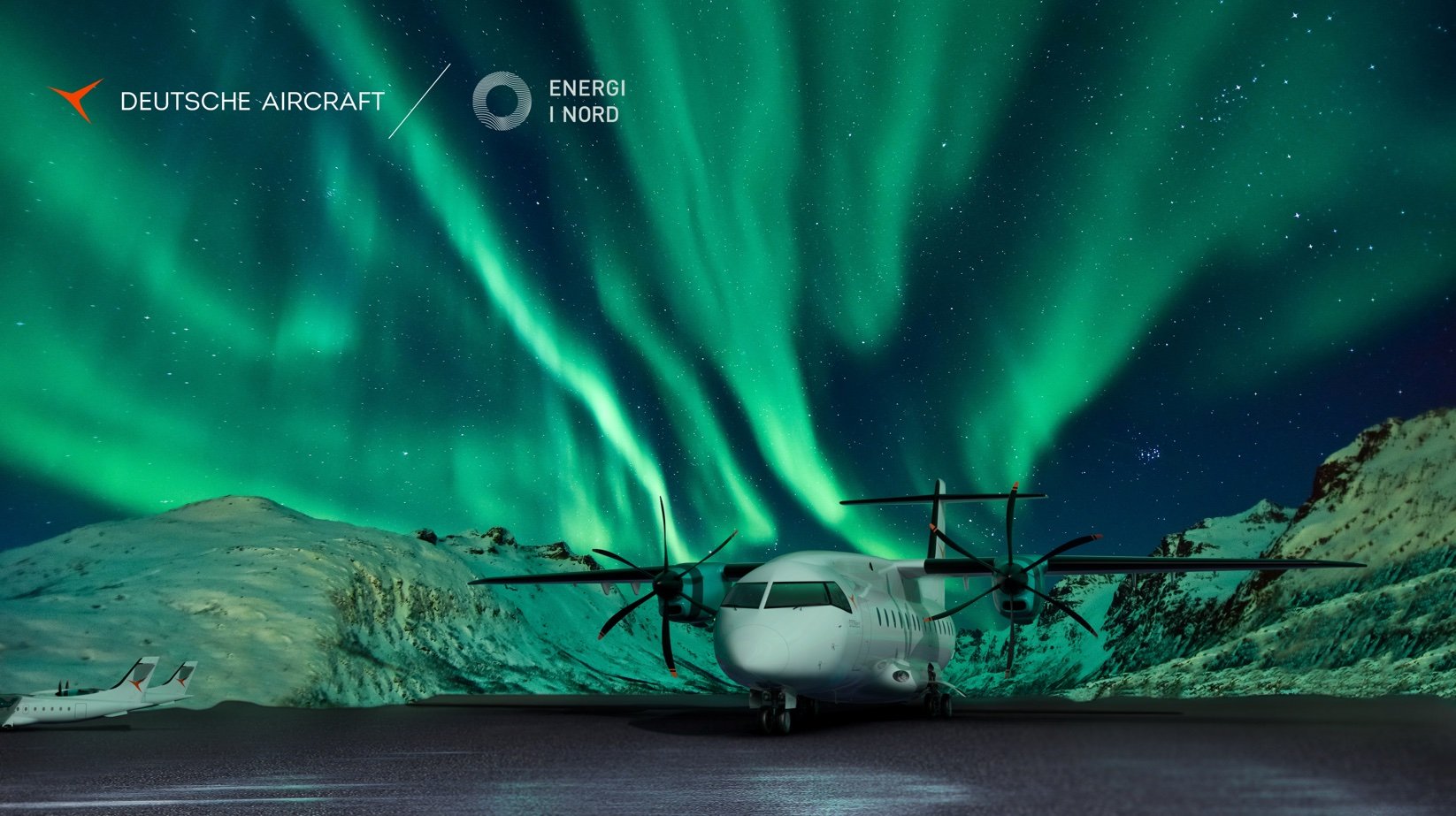Click Here to View This Page on Production Frontend
Click Here to Export Node Content
Click Here to View Printer-Friendly Version (Raw Backend)
Note: front-end display has links to styled print versions.
Content Node ID: 419464
An agreement reached this week between Deutsche Aircraft and Norway’s North Energy Cluster (NEC) is set to support plans for a new version of the Dornier 328 regional airliner meant to run on fully carbon-neutral fuel. The new project marks an interim step in a longer-term plan to eventually operate a 43-seat D328eco with a hydrogen propulsion system.
The letter of intent signed on March 14, which the partners say will achieve substantial short-term reductions of Northern Norway’s aviation climate footprint through the use of so-called e-fuels, calls on major wind and hydropower producers, technology suppliers, electrochemical companies to help build the infrastructure needed at the 26 airports in the secluded territory while Deutsche Aircraft provides the aircraft platform.
The manufacturer expects the first D328eco—a Pratt & Whitney PW127S-powered 43-seat stretch variant of the current PW119A-powered D328—to run on power-to-liquid (PtL) e-fuel by 2023 under a schedule that calls for the first revenue service in 2026. PtL fuel— a synthetically produced liquid hydrocarbon—uses renewable electricity as a key energy source. The three main steps in producing PtL consist of the conversion into carbon feedstock of carbon dioxide (CO2) captured via, for example, direct carbon capture; the synthesis of carbon feedstocks into “green” hydrogen using processes such as Fischer-Tropsch to generate liquid hydrogen; and, finally, the conversion of the liquid hydrogen into a synthetic equivalent of kerosene.
According to Deutsche Aircraft, sustainable aviation fuel (SAF) sold today using processes such as the hydro-processed esters and fatty acids (HEFA) production pathway achieve a maximum CO2 reduction of 80 percent, while PtL can achieve complete carbon neutrality.
“Since today the respective [ASTM] fuel standards are not yet available, we strive for partnerships with fuel suppliers to foster the early development of these standards in order to enable commercial use of PtL as quickly as possible,” said the manufacturer. “The objectives of the partnership are threefold: create business opportunities on both sides including fuel supply, work on e-fuel technologies both in the aircraft and on the fuel supply side, [and] prepare an overall business model for climate-neutral regional aviation. Thus, we [aim to] create access to e-fuels for our customers.”
The NEC includes fuel suppliers and industrial companies that dispose of the components needed to produce e-fuels. In the short term, plans call for the use of CO2 point sources to accelerate the development of Fischer-Tropsch e-fuels and, in the longer term, CO2 capture to achieve a 100 percent CO2 reduction balance. The group, based in the far north of Norway, has already started three projects linked to PtL production that will use CO2 point sources (from ferro silicon and cement production) as well as green hydrogen.
“E-fuels and hydrogen produced from renewable energies remain the most promising scalable solutions to significantly reduce emissions in one of the most hard-to-abate sectors such as aviation,” said NEC cluster manager Anders Tørud. “What is key to make it happen, is to bring down production costs through scale and we have the right ecosystem in Northern Norway to do so.”
Those aspirations extend to a plan to render Norway’s Lofoten Islands climate-neutral called the Lofoten Project. Backed by local destination company Visit Lofoten, the Lofoten regional council, and the local power company Lofotkraft (a member of NEC), the project would bring sustainable tourism to one of Norway’s most untouched regions using the Do 328eco on short-haul routes from the mainland.
The Norwegian government has said that all domestic flights should run entirely on electricity by 2040. Neighboring Sweden aims to achieve fully carbon-free domestic flights by 2030.
Last year, Universal Hydrogen began studies with Deutsche Aircraft to evaluate the potential for installing its modular hydrogen capsules in the 1990s-vintage Dornier 328 regional airliner. The collaboration follows a related partnership agreement between Germany-based Deutsche Aircraft and H2Fly to develop hydrogen fuel cell technology for the twin-turboprop aircraft.
Deutsche Aircraft and Universal Hydrogen will analyze the size and integration of the modular capsule technology for hydrogen storage into the aircraft structures and systems. They will also consider aircraft weight and balance, as well as the cost of infrastructure and fuel, mission performance, and hydrogen logistics network design.
The planned demonstrator aircraft will carry a much more powerful 1.5-MW hydrogen system. The partners aim to certify hydrogen-powered aircraft under the requirements of EASA’s CS-25 class for certifying larger commercial airliners.
